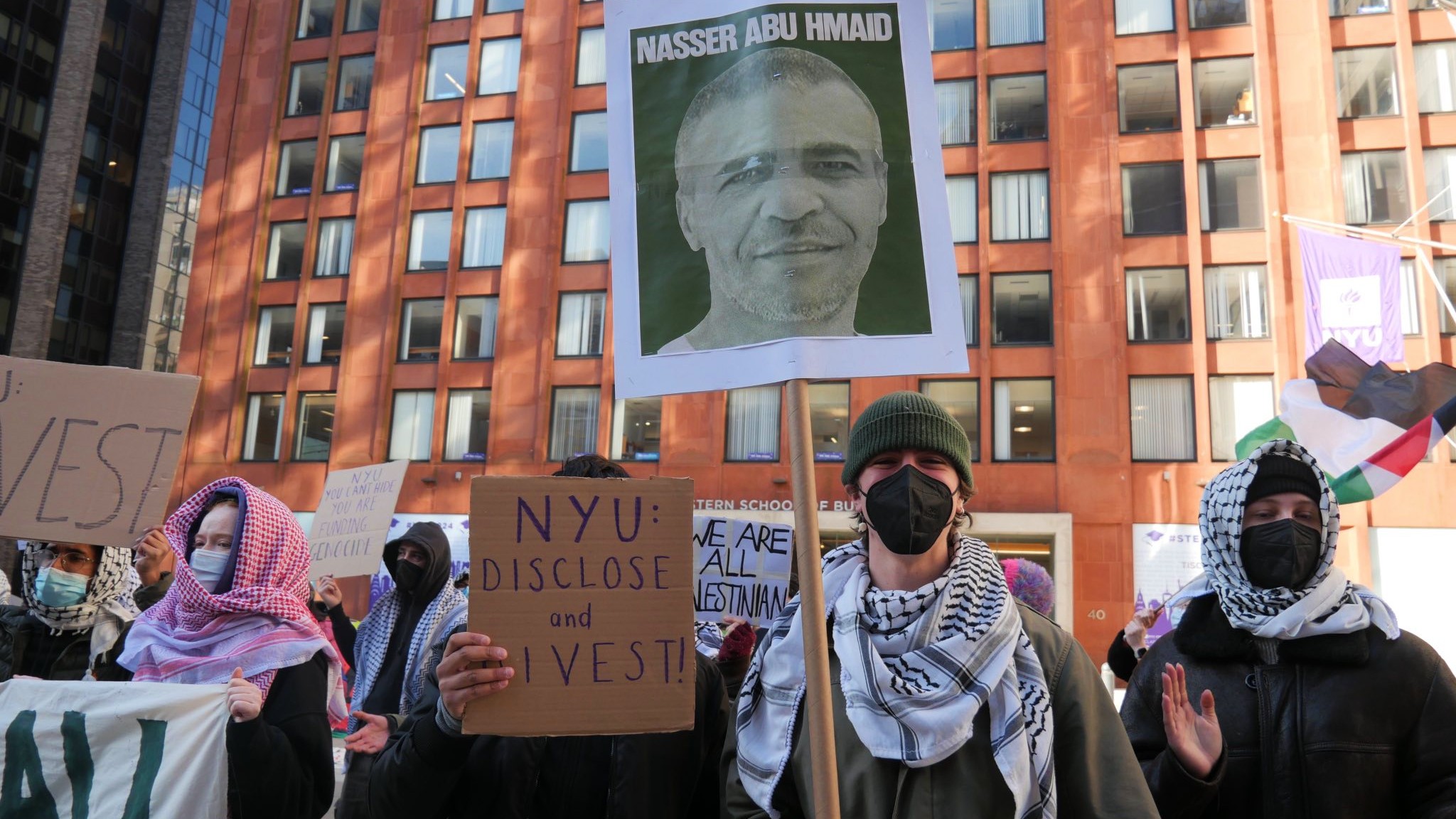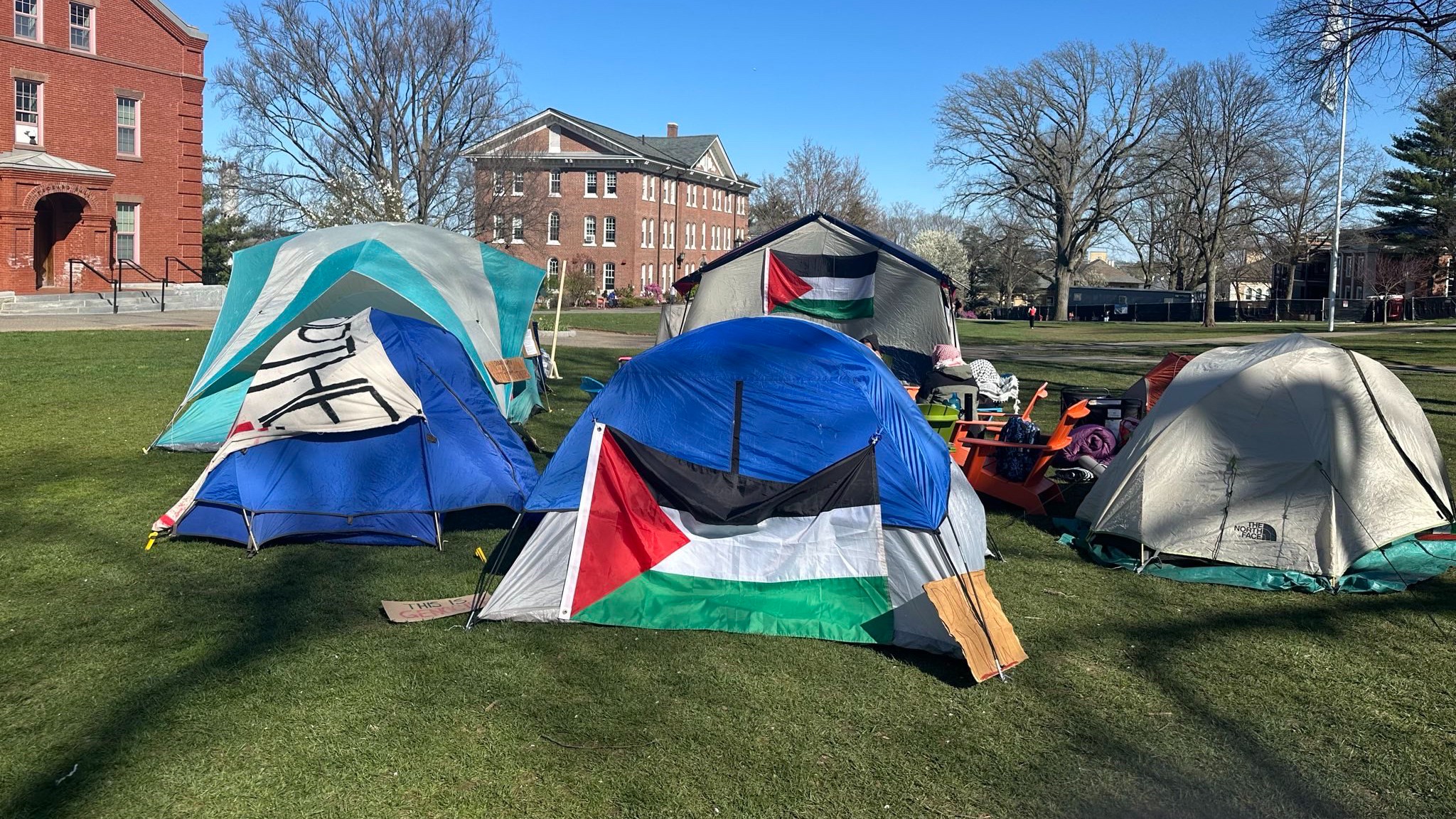Scholars launch boycott of Columbia University as protests spread across US
Protests expand to at least ten major universities as treatment of pro-Palestine students draws growing condemnation from academics

Academics and scholars have vowed to boycott Columbia University over its repressive policies against protesting students in shocking scenes that have sparked a wider student movement for Palestine across the US.
Over the past 24 hours, student encampments have mushroomed in colleges - on the east coast, in particular - with more anticipated to begin over the next few days. Middle East Eye is aware of at least two other universities that are planning similar encampments which have not been announced yet.
Student encampments demanding divestment from companies involved in Israel's occupation of Palestinian land and "genocide" in Gaza have popped up at the Massachusetts Insitute of Technology (MIT); Tufts and Emerson in Boston; New York University and The New School in New York City; Vanderbilt in Nashville, Tennessee; Yale University in Connecticut; University of California-Berkeley; The University of Michigan; Washington University in St Louis; and The University of North Carolina at Chapel Hill.
In a statement sent to Middle East Eye, students at Tufts University said they had, in conjunction with students at Emerson and MIT, set up encampments on their campuses "as a part of a growing national student movement for divestment from genocide and apartheid".
"Our presence on campus, particularly in the Gaza solidarity encampment space, is dedicated to coalition building and meaningful solidarity organizing that furthers our campaign for institutional divestment. Engagement with the tenting demonstration is encouraged in all forms, but any efforts in the space must center Gaza and Palestinians’ material conditions and leverage our power and privilege to divest from their oppression," students at Tufts University in Boston, told MEE.
The Coalition for Palestinian Liberation at Tufts, made up of several groups, including Tufts Students for Justice in Palestine, said the demonstrations will continue.
"Until our institutions disclose their investments and divest from all companies that aid and abet the genocide in Palestine, we will continue organizing to disrupt business as usual."
Tufts, MIT and Emerson did not immediately reply to MEE's request for comment.
The spread of protests to several campuses around the country comes as several academics and groups have released statements distancing themselves from Columbia University over its decision to call the police onto campus to arrest students as well as mass suspensions of students for refusing to end their protests for Palestine.
At least 108 students from Columbia were arrested on Thursday, when the university's administrator, Nemat Minouche Shafik, called the New York Police Department to enter campus and dismantle an encampment on the main lawns that had started a day prior.
Around 85 students from Columbia University and Barnard College have since been suspended for taking part in the direct action. Similarly, at Yale University, 47 students were arrested on Monday morning, local time, for refusing to dismantle their camp.
The protest that began in the early hours of 17 April at Columbia University, comprising just over 100 students, mushroomed into a movement of hundreds after the arrests. Students spontaneously made their way to the lawns and immediately set up a new camp.
Organisers told MEE that several students who did not initially identify with the encampment felt compelled to join the movement out of disgust with the university administrators.
"The university absolutely shot itself in the foot here. When the first encampment started. I was trying to stay out of trouble. I sat on the steps far away and watched," one Jewish student at Columbia told MEE.
"When the arrests started, I saw my friends being dragged away ... treated so awfully by these giant police officers, and it was so cruel. It was very upsetting."
She said she felt compelled, like many others, to cast her fears and apprehensions aside and join the next encampment that had organically formed on the lawns.
"We understand that Palestinian liberation is not antithetical to Jewish liberation," the student added.
Academic and cultural boycott
The targeting of students, the attacks on academic freedom and the policing of speech at the university from administrators has also drawn condemnation from several academics and scholars with ties with Columbia.
Faculty at Columbia and Barnard College on Monday staged a walkout in support of students.
On Monday, academic Marc Lamont Hill, presidential professor at CUNY, said he would be pulling out of his scheduled lecture from Columbia over the ongoing repression at the university.
"I am scheduled to give the 2024 Mamie Phipps Clark and Kenneth B Clark Distinguished Lecture at Columbia University.
"In light of the university’s current repression and criminalization of students, as well as the present academic boycott of the institution, I have canceled my appearance and will not accept the accompanying $10,000 award. I urge Columbia University to meet each of the principled and reasonable demands of the boycott," Hill added.
Hours earlier, the Graduate Center Program in English announced a full academic boycott of Columbia and Barnard College "until they reinstate suspended students and respond to their demands: transparency, divestment, liberation".
Several others have released public statements cutting ties with the prestigious university.
On Tuesday, the anti-Zionist group, Jewish Voice for Peace (JVP), said the University of Columbia and Barnard College had created a climate of repression and harm for students peacefully protesting for an end to the Israeli "genocide" against Palestinians in Gaza.
Whereas several pro-Israel supporters and commentators, as well as the White House, have put out statements registering concerns about antisemitism on campus, JVP clarified that it was Jewish students speaking up for Palestine who were being targeted by the administrators.
"Students have faced attacks to their physical safety while on campus, endured public doxxing in the media, and are exposed to hate speech by faculty and staff," JVP said in a statement.
"Columbia University has actively created a hostile environment for students who are Palestinian or who support Palestinian freedom. Additionally, the administration’s actions have made the campus much less safe for Jewish students," the group added.
The group noted that out of the 85 students who were suspended for taking part in the encampment at Columbia, 15 were Jewish students.
https://www.middleeasteye.net/news/war-gaza-scholars-launch-boycott-columbia-university-over-student-repression



0 Comments:
Post a Comment
Subscribe to Post Comments [Atom]
<< Home